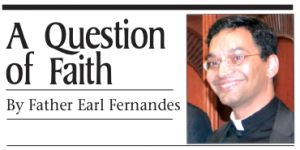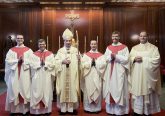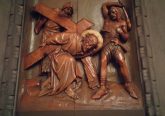Q&A: What does the church teach about Reiki?
Dear Father: What does the Church teach about Reiki? Why do people turn to these types of things instead of Jesus or the saints?
Dear Reader: Thank you for your question.Some years ago, I was in the Metaphysics section of a bookstore. I was edified thinking that a mainstream bookstore had philosophy books. I began browsing. Much to my dismay the books dealt with magic, spells, Wiccan worship, the New Age Movement, Reiki, and other forms of therapy.
In his book, Why the Church? Msgr. Luigi Giussani describes the medieval culture as one united by a common faith. The building of the great cathedrals – a common effort- and the cathedrals, places where God dwelt with His people and where all the people- saints and sinners alike- gathered, were signs of this unified, Christian culture. Giussani traces the gradual fragmentation of this culture the Renaissance and modern period. Today, we live in an increasingly fragmented, secular world in which Christian faith appears on the wane. The problems that people face, including the reality of human suffering, remain.
As Catholics, we believe that the suffering and death of Jesus give meaning to suffering. When faith in God (and in Christ, in particular) wanes, people look elsewhere to find healing. The First Commandment warns against idolatry and the Catechism of the Catholic Church (2115-2117) addresses the various forms of idolatry that result from a lack of faith in Divine Providence. Christian faith rejects forms of divination, Satan worship, conjuring the dead, and the like. The Catechism (2116) reads: “Consulting horoscopes, astrology, palm reading, interpretation of omens and lots, the phenomena of clairvoyance, and recourse to mediums all conceal a desire for power over time, history, and, in the last analysis, other human beings, as well as a wish to conciliate hidden powers. They contradict the honor, respect, and loving fear that we owe to God alone.”
It continues (2117): “All practices of magic or sorcery, by which one attempts to tame occult powers, so as to place them at one’s service and have a supernatural power over others – even if this were for the sake of restoring their health – are gravely contrary to the virtue of religion.”
Many people who resort to such practices are desperate in the face of suffering; rather than turn to many of the devotional practices of Catholicism and trusting in Divine Providence, they are swept away by other methods purported to bring “healing”, including techniques used by the New Age Movement and Reiki. The Pontifical Councils for Culture and Inter-Religious Dialogue issued a document titled, “Jesus Christ the Bearer of the Water of Life”, which describes certain New Age practices which are incompatible with Catholic Faith. It is well worth a read.
The United States Conference of Catholic Bishops Committee on Doctrine addressed the issue of the use of Reiki in its 2009 document “Guidelines for Evaluating Reiki as an Alternative Therapy.” The bishops noted that the Church recognizes two kinds of healing: healing by divine grace and healing that utilizes the powers of nature. Jesus and the Apostles performed many healing miracles, signs of the divinity of Christ and the coming of the Kingdom. Divine healing and natural healing are not mutually exclusive.
Reiki is a technique that claims that illness is a result of a disruption or imbalance in one’s life “energy.” Through the position of one’s hands, practitioners of Reiki attempt to channel the “universal life energy” to the patient for healing and balance. While practitioners claim that Reiki is merely a technique, it makes use of spiritual terms and, at times, claims spiritual healing in contrast to traditional medicine.
Others claim Reiki is a “way of living.” Many practitioners of Reiki are nurses who honestly believe that it is a medical technique. If it is just a medical technique, then it should be judged according to the criteria set forth by the medical field and by the natural sciences, but the natural sciences do not seem to find evidence of the “universal life energy”.
When judging Reiki according to Christian or Catholic standards, one seriously must question the “source” attributed to the healing. For the Reiki practitioner, he or she is either the conduit for healing from the “divine consciousness” or the source of healing. In contrast, for the Christian, the source of divine healing is God in Christ Jesus. The American bishops warn against Reiki as being a possible form of superstition. They conclude “Since Reiki therapy is not compatible with either Christian teaching or scientific evidence, it would be inappropriate for Catholic institutions, such as Catholic health care facilities and retreat centers, or persons representing the Church, such as Catholic chaplains, to promote or to provide support for Reiki therapy.”
In the end, it is a question of whether one firmly trusts in the power of the one true God to save and heal. It is a question of faith.
This A Question of Faith column originally appeared in the March 2015 print edition of The Catholic Telegraph.














